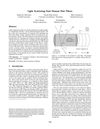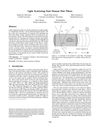
Search
for
Sort by
Research
780-810 / 1000+ results

research Scalp Micropigmentation: A Cosmetic Treatment for Hair Restoration in Asians
SMP creates illusion of full hair, addressing various issues and bringing happiness to those with thinning hair.

research Wound Healing: A Cellular Perspective
The document concludes that better targeted treatments are needed for wound healing, and single-cell technologies may improve cell-based therapies.

research Obesity and the Skin: Skin Physiology and Skin Manifestations of Obesity
Obesity affects skin health, causing conditions like acanthosis nigricans and may require different treatment approaches.

research Skin Melanocytes: Biology and Development
The paper concludes that understanding melanocyte development can help in insights into skin diseases and melanoma diversity.

research Alopecia Areata Update
Half of people with Alopecia Areata may see hair regrowth within a year without treatment, but recovery is unpredictable.

research Fgf9 From Dermal γδ T Cells Induces Hair Follicle Neogenesis After Wounding
A protein from certain immune cells is key for new hair growth after skin injury in mice.

research The Human Tri-Peptide GHK and Tissue Remodeling
The peptide GHK-Cu helps heal and remodel tissue, improves skin and hair health, and has potential for treating age-related inflammatory diseases.

research Light Scattering from Human Hair Fibers
Researchers developed a new model for more realistic computer graphics rendering of hair by considering how light scatters on hair fibers.

research Liposomes in Dermatology Today
Liposomes improve drug delivery and reduce skin irritation in dermatology.

research Dermal Adipocyte Lipolysis and Myofibroblast Conversion Are Required for Efficient Skin Repair
Fat cells in the skin help start healing and form important repair cells after injury.

research Smoking and the Skin: Effects and Therapeutic Potential
Smoking harms the skin, causing early aging and increasing cancer risk, but stopping smoking can improve skin health.

research Folliculitis Decalvans: A Rare Inflammatory Scalp Disorder
Folliculitis decalvans is a rare scalp condition causing scarring hair loss, treated with long-term antibiotics and other medications, but it often comes back and is hard to manage.

research A Pilot Study of ICG Laser Therapy of Acne Vulgaris: Photodynamic and Photothermolysis Treatment
ICG-enhanced NIR laser therapy may be a promising acne treatment with improvement and no side effects.

research Platelet-Rich Plasma for Androgenetic Alopecia
PRP injections improve hair thickness for baldness.

research Whole-Genome Sequencing of Eight Goat Populations for the Detection of Selection Signatures Underlying Production and Adaptive Traits
Researchers identified genes linked to coat color, body size, cashmere production, and high altitude adaptation in goats.

research Nutritional Management in Women with Polycystic Ovary Syndrome: A Review Study
Eating fewer calories, less sugar and refined carbs, and more low-glycemic and omega-3 rich foods can help manage PCOS symptoms.

research Light Scattering from Human Hair Fibers
Researchers developed a new model for more realistic computer graphics of hair by considering how light scatters on hair fibers.

research Inherited Ichthyoses: Generalized Mendelian Disorders of Cornification
Inherited ichthyoses cause widespread skin scaling and thickening due to gene mutations.

research Platelet-Rich Plasma and Micrografts Enriched with Autologous Human Follicle Mesenchymal Stem Cells Improve Hair Regrowth in Androgenetic Alopecia: Biomolecular Pathway Analysis and Clinical Evaluation
PRP and HF-MSCs treatment improves hair growth, thickness, and density in androgenetic alopecia.

research The Facial Adipose Tissue: A Revision
Different types of facial fat affect aging and treatment outcomes; more research is needed to enhance anti-aging procedures.

research Evaluation and Diagnosis of the Hair Loss Patient
Trichoscopy is a quick, cost-effective tool for diagnosing different hair loss conditions.

research 5α-Reductase Inhibition and Hair Growth Promotion of Some Thai Plants Traditionally Used for Hair Treatment
Some Thai plants, especially Carthamus tinctorius, could help prevent hair loss and promote hair growth without adverse effects.

research Tumor Regression Predicts Higher Risk of Sentinel Node Involvement in Thin Cutaneous Melanomas
Shrinking skin cancer increases the chance of cancer in nearby lymph nodes.

research Systematic Review of Platelet-Rich Plasma Use in Androgenetic Alopecia Compared with Minoxidil, Finasteride, and Adult Stem Cell-Based Therapy
PRP injections may be a safe, effective alternative for hair loss treatment compared to minoxidil and finasteride.

research Mechanical Forces in Skin Disorders
Skin problems can be caused or worsened by physical forces and pressure on the skin.

research The Role of Micronutrients in Alopecia Areata: A Review
People with alopecia areata often have lower levels of vitamin D, zinc, and folate, but more research is needed to understand if supplements can help treat it.

research Unmet Medical Needs in Chronic, Non-Communicable Inflammatory Skin Diseases
There are still challenges in diagnosing and treating chronic skin diseases, but there is hope for future improvements.

research Potential Targets in the Discovery of New Hair Growth Promoters for Androgenic Alopecia
The document concludes that targeting 5α-reductase, the androgen receptor, and hair growth genes, along with using compounds with anti-androgenic properties, could lead to more effective hair loss treatments.

research Impact of Different Preparation Methods to Obtain Autologous Non-Activated Platelet-Rich Plasma and Activated Platelet-Rich Plasma in Plastic Surgery: Wound Healing and Hair Regrowth Evaluation
Different methods of preparing Platelet-Rich Plasma (PRP) can affect wound healing and hair regrowth in plastic surgery. Using a kit with specific standards helps isolate PRP that meets quality criteria. Non-Activated PRP and Activated PRP have varying effects depending on the tissue and condition treated. For hair regrowth, Non-Activated PRP increased hair density more than Activated PRP. Both treatments improved various aspects of scalp health.